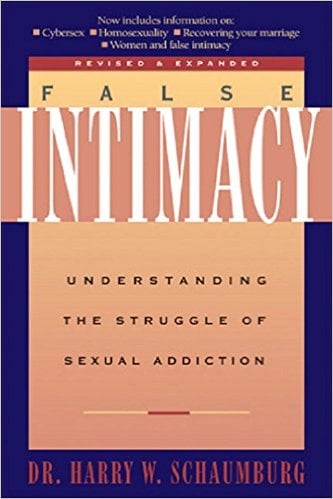⏱️ Estimated Reading Time: 4 min read
As a counselor, I probably speak with more men about pornography and sexual addiction than I do any other subject. Porn addiction has become an epidemic in the church, and helping guys fight for sexual purity has become almost a full-time job. As a result, I am always on the lookout for more helpful resources. Several works I’ve read referenced this book and after picking it up I can appreciate why. False Intimacy: Understanding the Struggle of Sexual Addiction is a fantastic resource. Where many books tend to focus either on the science and addiction components, or on the Biblical teaching on sexuality, Schaumburg combines both. This work is unique in its belief in the reality of sexual addictions and its use of Biblical/theological categories.
Dr. Harry Schaumburg is a counselor particularly focusing in the area of sexual addiction and misconduct. He’s also a trained theologian, with a doctorate from New York Theological Seminary. In this volume, he walks readers through a rather extensive amount of material to help them understand the nature and causes of sexual addiction, as well as recovery from it. The book’s eleven chapters and three appendices give a great depth of insight into this study.
The first three chapters introduce foundational issues: the nature of sexual addiction (dealing with definitions and internal/external dynamics), sexually addictive behaviors, and causes of sexual addiction. Here readers are given some insight into the advanced counseling discussions. Schaumburg writes for the lay reader, the work is intended to be engaging and accessible, and he achieves that goal. His discussions about the internal logic, so to speak, of the addicts mind is very helpful, as is his discussion of rationalizations and justifications that they use to excuse and justify their sin. And sin is the word that recurs throughout the book.
Despite being an addictions counselor, Schaumburg does not shy away from using theological language. In fact, he distinguishes between two models of causation: the medical disease model and the Biblical model. He opts for the latter and makes a compelling case for it. His compassion for the addict exudes from the pages of the work, yet such compassion does not lead him to remove moral culpability and spiritual implications from the equation. In this regard, Schaumburg offers a unique book.
In chapters 4-6, he begins to redirect readers towards the process of recovery. It begins with communicating hope, counseling the spouse of an addict, and establishing some guidance for restoring a marriage broken by porn. His use of both case studies and examples, along with Scriptural exegesis give lots of hope to readers. In fact, his chapter on hope was laced with more Biblical references than any other chapter in the book. Despite his expertise in this field, Schaumburg is convinced that a great deal of help and hope for recovery comes from repentance, dependence upon the Spirit, and the motivating power of the Word of God. That’s not to suggest that he doesn’t have a litany of practical advice, but it comes after an understanding of our need for God.
The remaining chapters in the book cover more nuanced issues: women and sexual sin; sexual addiction and children, and healing for church leaders. Here Schaumburg’s expertise shines through. He guides readers through a host of less frequently discussed issues and helps them to wrestle with the specific unique features of each. No doubt it will be a reference resource for me for in the future as I run across more unique cases of sexual addiction.
I greatly appreciated this book. Some books have seemed to completely ignore the element of sexual addiction; while others have so inflated it as to make it the only point worth discussing. Schaumburg maintains a strong balance. He is more than willing to discuss the nature of addiction and the complicated factors associated with it, but he does not shy away from the Biblical content that informs all our understanding of sin. False Intimacy is the kind of book every counselor needs to have on their shelf, even if only for reference. I highly commend False Intimacy to all readers—whether spouses of addicts, addicts, or counselors. It is work worthy of your time.
Dave Dunham is Associate Pastor of Discipleship and Counseling at Cornerstone Baptist Church in the Detroit Metro. He has a Master’s of Divinity from The Southern Baptist Theological Seminary.




